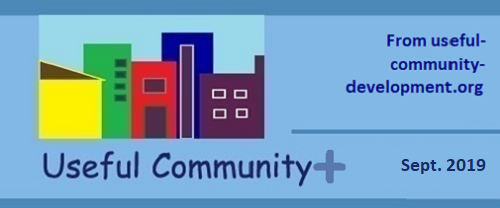| Back to Back Issues Page |
 |
|
Useful Community Plus September 26, 2019 |
In This Issue: 19 Ideas for Your Neighborhood Association Right Now Here Are the Neighborhood Association Kickoff Ideas You Requested One of our website readers asked about the most important reminders for new neighborhood association officers and members. That inspired a list. We are continually impressed with the huge variation in neighborhood and community groups, so we tried to pick some action items that would appeal to beginning groups and others to sophisticated ones. Here are 19; maybe one of them will strike a chord for you.
One of our website readers asked about the most important reminders for new neighborhood association officers and members. That inspired a list. We are continually impressed with the huge variation in neighborhood and community groups, so we tried to pick some action items that would appeal to beginning groups and others to sophisticated ones. Here are 19; maybe one of them will strike a chord for you.1. Pick up the pace of getting rid of your eyesores. Invite everyone in for some popcorn and apple cider to brainstorm how to do this. 2. Adopt or revise your social media policy. (Note that a sample policy is included in the Kindle version of an e-book by one of our authors, described in our e-book about starting a neighborhood association.) 3. Prepare an annual calendar, which includes general meetings, recurring committee meetings, festivals and special events, fund raising events and campaigns, and important happenings in your neighborhood sponsored by other groups, businesses, or individuals. This helps spot obvious conflicts. 4. Recruit and train new leaders. Prevent burnout through developing and testing a continuous pipeline of new people who bring creativity and energy to your work. Over-represent young people and any under-represented groups. 5. Invite elected leaders and important city/town/county staff members to share coffee or dinner with your key leaders in a comfortable private setting. This can help build trust on both sides and may result in a surprising exchange of information. 6. Present a program highlighting common code complaints in your neighborhood, and how to remedy them. This might involve presentations from contractors or city staff. 7. Check into how major city and regional documents are likely to impact your neighborhood in the future. Look at your city's comprehensive plan, policies being studied by the planning commission, and the metropolitan planning organization's 20-year transportation plan. Ask local offices of state or national environmental organizations how their regulations might affect your future. 8. Put together some sessions dealing with local climate change impacts you are experiencing or anticipating. This might involve committee work or major initiatives to bring residents to informational presentations. 9. Talk about how to assure a high rate of cooperation in the upcoming 2020 Census if you live in the U.S. The Census impacts everything from business attraction to social services to funding, so make sure all groups are counted. 10. Schedule a board retreat for early in the new year. (A previous newsletter gives tips.) 11. Mend fences. If your organization has been at odds with an elected official, another group, a particular business or type of business, city staff members, or another neighborhood, figure out how you can co-exist peacefully and learn to appreciate one another. 12. Plan an outreach to area businesses if they are not active in your association. Set aside one or two parts of days for this, and assign pairs from your organization to visit the business owners or managers and present your organization’s plans and concerns. 13. Identify one promising new fund-raising method, unless you are that extremely rare organization that has all the money you need. Ask members who are rarely consulted for their ideas, even as the board retains its rightful responsibility for funding. 14. Plan a holiday good deed that also will benefit the neighborhood. If someone needs help on home repairs, volunteer as a group. If young teens seem to have nothing to do, throw them a party or better yet, figure out an ongoing recreation opportunity for them. If a few households or many families are living in poverty, give a super-practical gift basket. Help an elderly homeowner adapt a family homestead to meet current needs. 15. Strengthen yourselves by learning from other organizations. If your city does not have an alliance of neighborhood associations, form one. If that seems too daunting, at least hold an occasional networking and joint learning opportunity. 16. Figure out a tour route through your neighborhood showcasing either your gems or your opportunities awaiting action. Offer the tour regularly, whether annually or monthly, for the benefit of new residents and residents of other parts of your metro area. 17. Discuss and agree on a housing condition survey if you perceive any housing maintenance issues at all in your area. You can do it yourself if your city won't help. 18. If you have opportunities for infill housing, begin a serious discussion with residents, architects, and developers. 19. You knew we couldn’t stop before reminding you to clean up your neighborhood park. New Resources for Finding DataThis month two that impressed us were:1. Engaging little short videos from the Census Bureau about how to find their data, and 2. A new way to find data compiled by Urban Institute researchers. New On the Useful Community Development Website This MonthThis month we answered just a few questions from site visitors. Ask a question yourself by visiting the community development question page.Here are the new articles: How to Stop a Variance As always, feel free to contact us. See you next month. |
| Back to Back Issues Page |